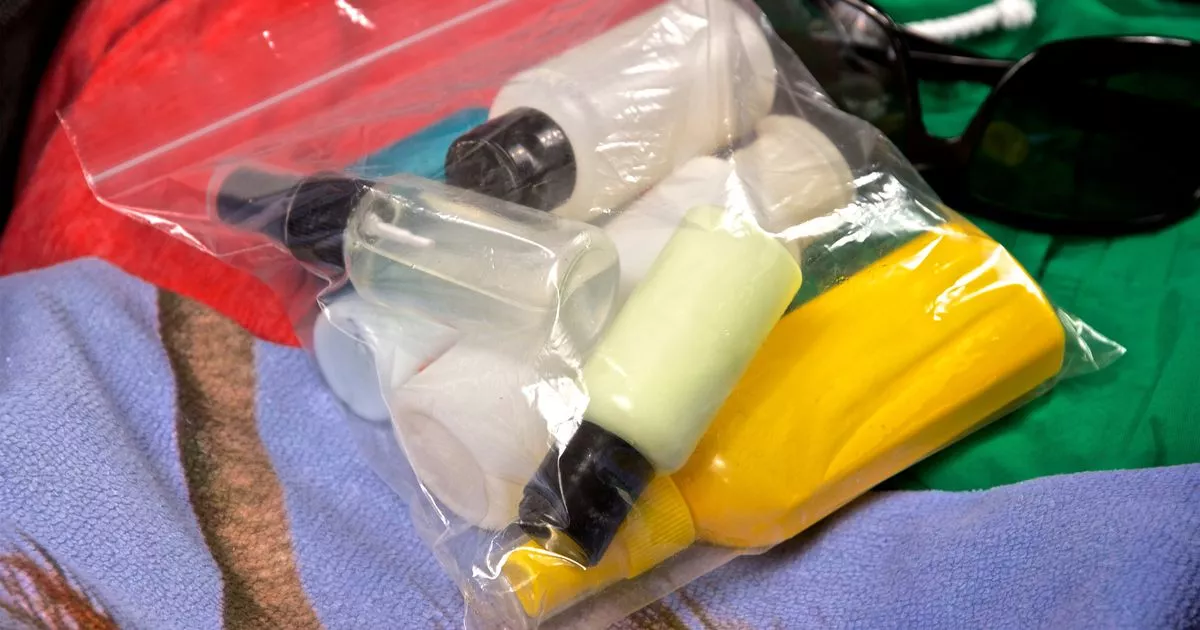A major airport in Britain has become the fourth to lift restrictions on liquids and electronic devices in hand luggage. Bristol Airport has become the latest airport to install new security scanners, meaning travelers no longer have to follow the strict rules for 100ml liquids and placing them in clear plastic bags.
It also means passengers no longer have to take off electronic devices such as laptops when going through security. The Next Generation Security Checkpoint (NGSC) scanners were due to be rolled out at major airports in Britain before this summer, with the government setting a nominal deadline of June 1, but many were due to be granted extensions – including Manchester Airport – with some only rolling out the new technology in 2025.
Aberdeen, Teesside and London City airports have all installed machines using 3D scanning technology, and have seen queue times cut by 50 per cent after the scanners arrived, eliminating the need for manual baggage checks. Now Bristol Airport has joined them.
READ MORE: Scam warning for passengers charging phones at airports
Thanks to the new scanners, passengers can take bottles with up to two liters of liquid in their hand luggage. Bristol Airport has invested £11.5 million in the scanners, which will be in use from June 14. Bristol Airport said that, due to excellent regulatory approval, only liquids up to 330ml are allowed to be carried. Passengers will need to empty the contents of their pockets into their bags and empty the contents of metal water bottles.
Bristol Airport’s Chief Operating Officer said: “We are pleased that all customers traveling from Bristol Airport will benefit from the introduction of state-of-the-art technology to security.
“The new equipment will reduce customer stress and inconvenience as it will no longer be necessary to place 100ml of liquids in clear plastic bags and remove them from hand luggage. The new process delivers a much more customer-friendly security operation, using the latest technology and enhanced screening, allowing customers to keep personal items in their carry-on luggage.
“We have invested more than £11.5 million in security equipment improvements, and as with all complex and large-scale projects carried out 24 hours a day, seven days a week, we required a phased approach to introducing the new equipment. and processes. However, customers should be reminded that there have been no immediate changes to the rules governing what can be taken through security as a result of this initiative, and current carry-on baggage restrictions will remain in place until June 14, 2024.
“Customers are reminded that whilst Great Britain has introduced the new safety regulations when returning from destination airports, customers are advised to check the requirements of their departing airport as these regulations may differ from those in Great Britain.”
Bristol Airport is also modernizing its Fast Track security channels between June 14 and July 31. Pre-booked Fast Track customers will be routed through a dedicated queue in the Central Search area during the upgrade.
The government previously announced it had granted extensions to several major UK airports that could not meet the June 1 deadline to fully install the new scanning technology. At airports where they have not been introduced, the limit remains 100ml and containers must be placed in clear plastic bags.
Ministers have issued extensions of up to 12 months for several airports on a case-by-case basis, which is expected to be sufficient time for all of them to complete the work. The government is also exploring how to impose financial penalties for further non-compliance.
Heathrow Airport has predicted that all security lanes will have new scanners this summer, while Gatwick aims to complete the program by March next year. Manchester Airports Group, which manages Manchester, East Midlands and Stansted airports, estimates that their scanners will be fully deployed by 2025.
London City made history as Britain’s first major airport to implement the new scanners for all passengers in April last year, following the introduction of airport security restrictions on liquids in 2006 following a foiled terror plot aimed at flying planes flew from London to the United States to detonate. US with homemade liquid explosives.
Click here for more of today’s top stories.
